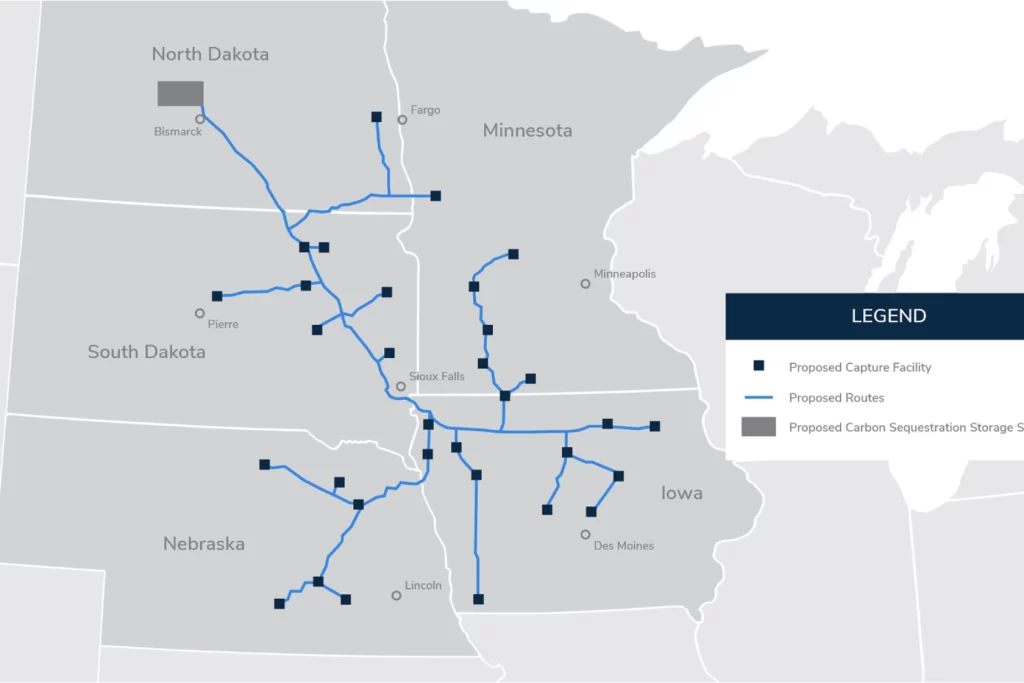South Dakota has become “ground zero” for two carbon sequestration proposals. One by Summit Carbon Solutions and the other by Navigator CO2 Ventures.
Carbon-capture and sequestration, known as CCS, is the collection of carbon dioxide (CO2) emissions created as a byproduct from industrial sites, such as ethanal and fertilizer plants, where it is collected and transformed into a liquid under intense pressure, transported through miles of underground pipelines, and buried miles beneath the surface of the Earth.
The environmentalists and climate change alarmists claim CCS is one of the main ways to save the planet from overheating and melting the polar ice caps, but there is an entirely different story why the capture of carbon dioxide has become such a hot topic and all you need to do is follow the money.
It all began in 2005 when former Democrat U.S. Sen. Tom Daschle, from South Dakota, passed the Renewable Fuel Standard Act setting a minimum requirement for the use of ethanol in fuel and made it profitable for investors and farmers to grow millions of acres of corn to produce ethanol. Ethanol was initially promoted as a renewable resource used as an additive to gasoline to partially reduce our nation’s reliance on foreign oil.
Today, the United States is the world’s largest producer of ethanol producing over 1.5 billion gallons in 2021. And now, companies like Summit Carbon Solutions are being formed to sell carbon offset credits that are then bought by companies in pursuit of “net-zero” climate goals.
That’s what this story is all about.
These companies are selling “carbon dioxide removal credits”, or CDRs to polluting companies wanting to claim they are climate-friendly by buying CDRs. Summit intends to bury 9 to 12 million metric tons of carbon per year. In a press release by Summit, they announced a joint venture with several international investors looking to purchase over 1 million tons of CDRs by 2025, giving them a “strong foothold in the voluntary carbon offset market.”
In addition, the U.S. Congress has been supportive of CCS and allocated billions in funding to support research and development of carbon-capture projects. Between 2010 and 2020, they provided $10.7 billion to CCS-related programs and President Biden’s Inflation Reduction Act, gave another $12 billion for CCS projects. Congress also provided tax incentives in Section 45Q of the IRS Code to companies for carbon sequestration and Biden’s Inflation Reduction Act increased the tax credit from $50 per ton to $85 per ton giving tremendous incentives to companies.
Both Summit and Navigator seek to use CCS to collect a combined 27 million tons of CO2 from 52 ethanol and fertilizer plants and pipe the pressurized liquid carbon across a combined 531 miles of private property in the state of South Dakota. The Pipelines end in North Dakota and Illinois, respectively, where the carbon will be pumped a mile into the ground and stored forever.
Sequestration simply means burying the captured CO2 in the ground where it can’t be used by farmers or nature to produce crops, forests or be exchanged into the atmosphere or oceans by microorganisms, plants, or animals.
Carbon dioxide is simply what people and animals breathe out after breathing in oxygen. Carbon dioxide is a heavier gas that creates the natural blanket in the atmosphere that keeps our world warm. This natural blanket is made up of several gases nicknamed “greenhouse gases” because they hold in heat, just like glass panes of a greenhouse.
For years, environmentalists and alarmists have claimed man has pumped more CO2 into the atmosphere and is causing the Earth’s temperature to rise.
Climate change has become the “catch-all” euphemism for every environmental cause, political agenda, and economic scheme rolled up into one.
One of the most unfortunate aspects of this story is it pits farmers against farmers. There are those farmers who are growing the corn and taking advantage of the ethanol production, which is their property right to do so, but then there are the farmers whose land is being condemned by these private companies to bury high-pressure liquid pipelines through miles of private property.
In fact, landowners have been dealing with the local, state, and federal permitting process for the two pipelines spending thousands of dollars defending their property rights, but no one, including Governor Khristi Noem, has done anything to help.
Summit has been selling the CDRs (credits) to multinational corporations before securing easements with any of the landowners, raising concerns with Rep. Jon Hansen of Dell Rapids, S.D. He said in an interview with Forum News Service: “Apparently the private property rights of South Dakotans are just a minor detail to be overlooked when you’re pushing the D.C. liberal climate agenda funded by a windfall of federal tax credits.”
It has been reported that Summit has now filed over 200 condemnation cases to condemn landowners’ private property because many have resisted and not given them permission with voluntary easements.
Carbon sequestration is big business aided by the federal government. No wonder Summit and Navigator have put profits over protecting landowner’s property rights. They are both going to make billions of dollars at the expense and safety of landowners and their private property rights.


